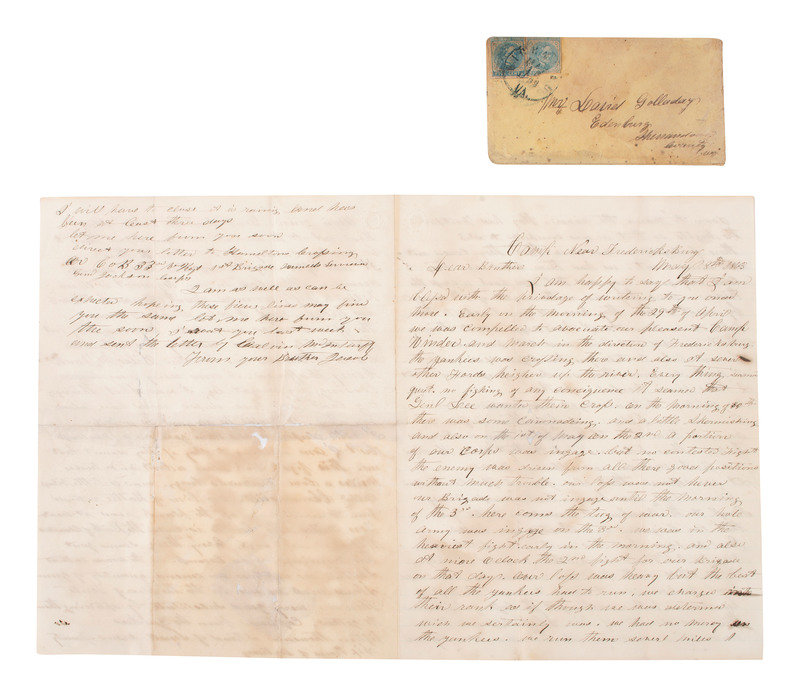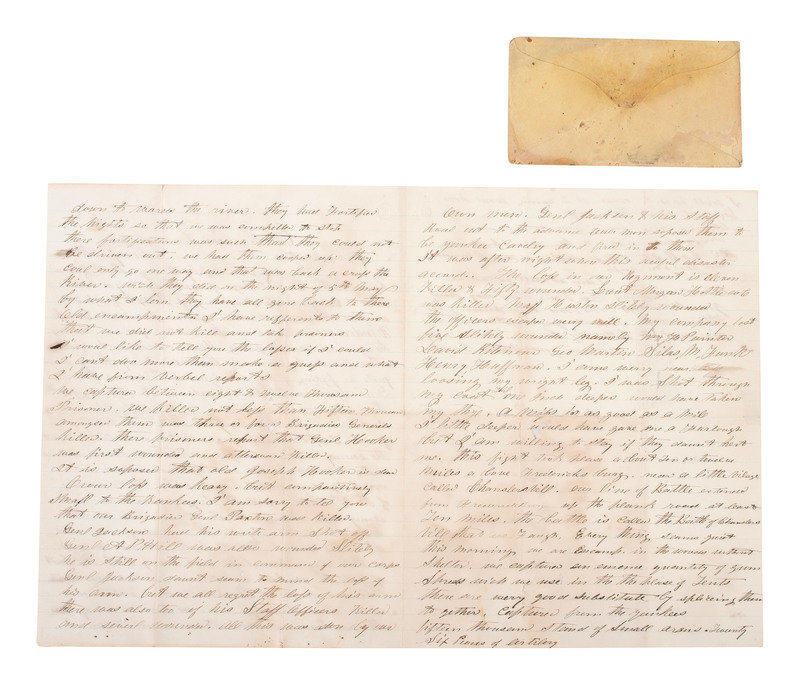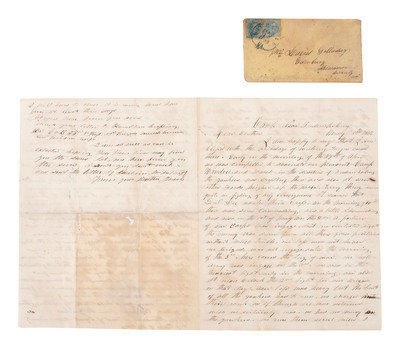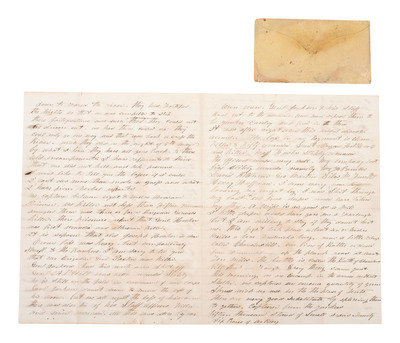Condition Report
Contact Information
Auction Specialist
Lot 117
Lot Description
3 1/2 pages, 7 3/4 x 10 in. Some small losses, creasing along folds with some tearing to edges, toning/discoloration in some areas. With postally used cover addressed to Mr. David Golladay of Edenburg, VA.
In this letter to his brother, Captain Golladay writes about one of the most significant Confederate victories of the Civil War at Chancellorsville.
He begins with his evacuation of camp at Winder on the morning of 29 April, and the subsequent march toward Fredericksburg: "...the Yankees was crossing there and also at several other Fords higher up the river. Every thing seamed [sic] quiet. no fighting of any conciquence [sic] it seamed that Genl Lee wanted them cross..." The next two days there was some cannonading and minor skirmishing, and on 2 May, a portion of the corps was engaged but without a "contested fight." He writes, "the enemy was driven from all there [sic] good positions without much trouble..."
Things would change on the morning of 3 May, when Golladay's brigade finally engaged. He writes, "here coms [sic] the tug of war." He reports that the heaviest fighting took place early in the morning and again at 9 o'clock. "Our loss was heavy but the best of all the yankees had to run, we charged into their rank as if though we was determined wich [sic] we sertainly [sic] was. we had no mercy on the yankees."
The rebels' momentum was halted, however, after chasing the Union troops toward the river and discovering their substantial fortifications, from which they could not be driven out. Golladay describes the situation: "we had them cooped up. they could only go one way and that was back across the River. wich they did on the night of the 5th May."
With the exact results of the battle still clear, Golladay hazards a guess at the losses from verbal reports. "We captured between eight & twelve thousand Prisoner. we killed not less than fifteen thousand amongsed [sic] them was three or four Brigadier Generals killed. there prisoners report that Genl Hooker was first wounded and afterward killed."
He then discusses the losses from their own side, including General Stonewall Jackson's arm: "Our loss was heavy, but comparitively [sic] small to the Yankees. I am sorry to tel [sic] you that our Brigadier Genl Paxton was killed. Genl Jackson had his write [sic] arm shot off Genl A P Hill was also wounded slitely [sic] he is still on the field in command of our corps. Genl Jackson daunt [sic] seem to mind the loss of his arm. but we all regret the loss of his arm..."
Notably, Golladay also reports that two of General Jackson's staff officers were killed (and several wounded) by "our own men." He then explains how it happened: "Genl Jackson & his staff Road out to the advance our men suposed [sic] them to be yankee cavelry [sic] and fired in to them. It was after night when this awful disaster accured [sic]..."
Captain Golladay then gives more details of their losses, naming the 5 men from his company that were wounded, and describing how he was nearly among them: "I come [sic] verry [sic] near loosing [sic] my wright [sic] leg. I was Shot through my coat one inch deeper would have taken my thye [sic]. His commentary on the near miss shows his resolve: "A miss is a good as a mile...little deeper would have gave me a Furlough but I am willing to stay if they daunt hert [sic] me."
Provenance: Letter found a home owned by Anna B. Stephens in Fort Valley, VA. The home had been previously owned by George R. Golladay, a descendent of Jacob Golladay. (Shenandoah newspaper article, 27 October 1994).
Jacob Golladay (1838-1874) enlisted as a lieutenant and was commissioned into Company B of the 33rd Virginia Infantry Regiment on 29 August 1861. After being promoted to captain in April of 1862, he was wounded at Malvern Hill on 1 July. He was listed as being absent for sickness in November of 1863, and returned to the regiment that December. He was promoted to major in March of 1864, and was taken prisoner later that year on 23 September at Woodstock, VA, and took the Oath of Allegiance in July of the following year, and was released the same day. He died in 1874 and is buried in the cemetery at Emanuel Lutheran Church, Woodstock, VA.



